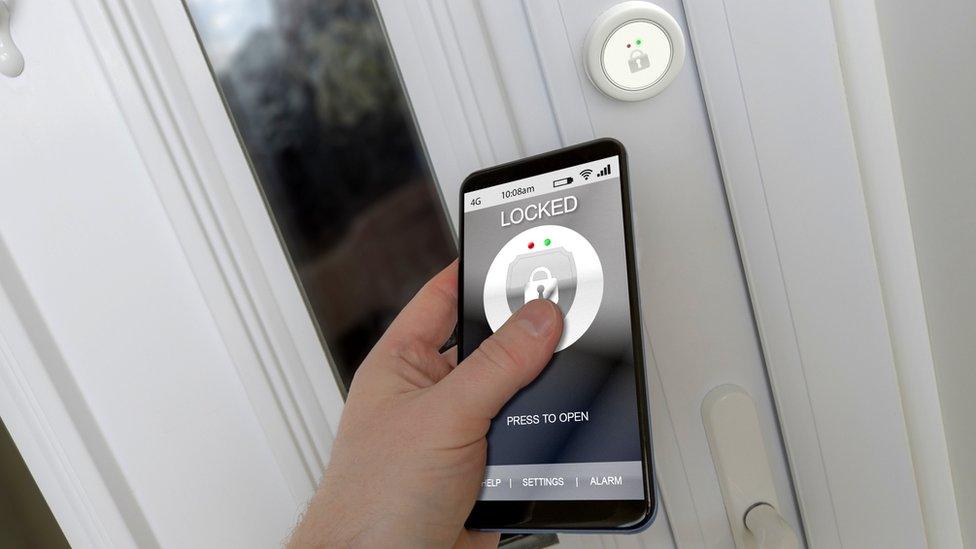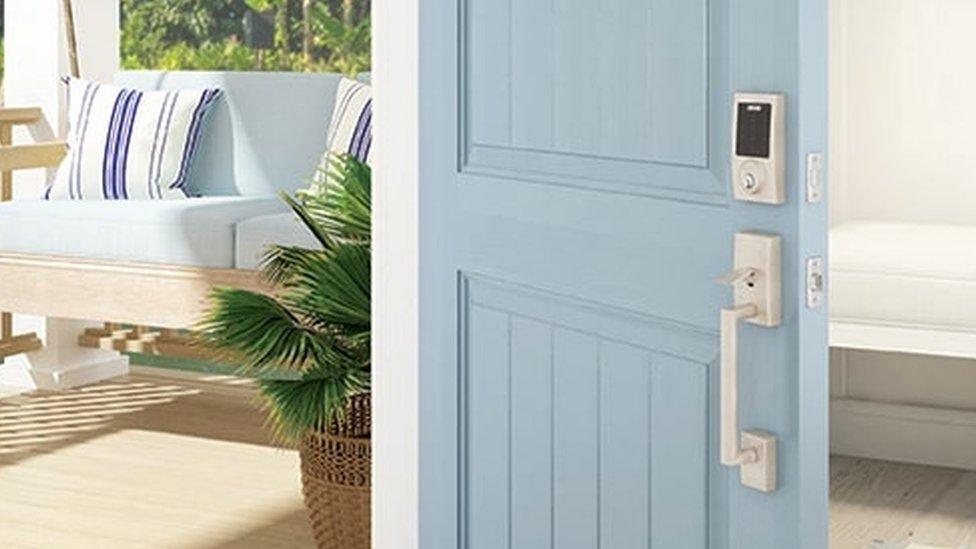Smart locks: Convenience comes with security doubts
- Published

Smart locks are becoming more common
For Candace Nelson, finding out about smart locks from a friend "really was a game changer".
People like her, who live with Obsessive Compulsive Disorder (OCD), often feel a need to perform routines like washing their hands, counting things or checking a door is locked.
"I have quite a few times nearly made it to work and couldn't remember if I locked the door, so I'd turn around," she says.
On other occasions she has driven for an hour before turning back. "My brain will not stop until I know for sure," explains Miss Nelson, who works for the Girl Scouts in Charleston, West Virginia.
But in September she installed a door lock that she can monitor from her smartphone.
"Being able to just look at my phone and feel that sense of comfort really helps put me at ease," she says.

Like many people, Candace Nelson appreciates the convenience of a smart lock
Smart locks like Kwikset's Kevo began to appear in 2013. Using a Kevo, your smartphone transmits the key by bluetooth from your pocket, then you touch the lock to open it.
Bluetooth uses less energy than wi-fi, but offers fewer features.
Raising the stakes, Yale's August and Schlage's Encode, launched in 2018 and 2019, have wi-fi as well.
Wi-fi lets you monitor and control the lock when you're away from home, and see the face of your Amazon delivery person who wants to get in.
Connecting with wi-fi also allows your lock to talk to Alexa or Siri, and turn on your lights and adjust the thermostat when you get home. The electronic equivalent of a dog fetching your slippers.
Using a smartphone as a key has become especially popular for AirBnB hosts, and the rental platform has a partnership with Yale.
Worldwide, the smart lock market is on track to reach $4.4bn (£3.2bn) in 2027, up tenfold from $420m in 2016, according to market research firm Statista, external.
Smartphone keys are also gaining popularity in Asia.
Taiwan-based Tracy Tsai, research firm Gartner's vice president for connected homes, points out that people are already happy to use smartphones for shopping so using them as a key is a small step.


But some analysts worry about the fast growth of the market and whether locks are secure enough.
As principal security researcher at Tripwire, a risk management software firm, Craig Young has tested many smart locks.
He says he would not be comfortable having a smart lock on his home. Mr Young thinks that some manufacturers do not invest enough in looking for flaws in their systems.
"I think there's a lot of times that organisations are trying to reinvent the wheel for some of the fundamental components... and they don't have the necessary expertise to do that securely."
There is the risk that the lock could be opened by a hacker, but Mr Young is also concerned about reliability.
"Until I've seen better proven track records of reliability for the uptime of the services that are running the systems, as well as the individual components in these locks, I don't think it's a great idea to make your personal safety rely on these," he says.
Another challenge for manufacturers has been extending battery life, currently about six months for locks using wi-fi.

Battery life is the big challenge for digital locks, says Rob Martens from Allegion
"Wi-fi is very challenging. It's kind of the holy grail of Internet of Things devices," says Rob Martens, chief design officer at Allegion, which makes Schlage locks.
"The biggest challenge is creating a product that doesn't drain the battery," agrees Jeff Pouliot from Minneapolis smart lock maker Lockly.
One solution is to let locks conserve power in a standby mode, then check in every few seconds to see if they should stay connected to the wi-fi. The locks wake up quickly enough for the user not to notice any delay, but a lot of power is saved by the intermittent wi-fi connection.
It can also be tricky to install smart locks.
Yale Locks has a retrofit device that fits over an existing deadbolt with a few screws.
Helpful if you're in rented accommodation, although a problem is lock types. In Asia and the US, they're pretty standard, but in the UK, houses can be very old and quirky.
"I'm a bit of a door nerd now," confesses Kate Clark, London-based managing director for Stockholm's ASSA ABLOY Group, which makes Yale Locks.

Smart locks are popular for holiday homes
For fast-growing parts of South East Asia, like Vietnam and Indonesia, holiday homes and smart locks are popular, but the internet connections may be ropy.
One workaround is dispensing with internet connectivity altogether.
A server can use an algorithm to give you a code a lock can recognise without being connected to the network, says Cherry Lim from Singapore-based Igloohome, which makes a device using this principle. "The lock knows this code works from 3:30 to 5:50," she says.
Lock makers now realise they need to design for two very different types of users, says Mr Martens.
Some want an "active command and control experience" using Siri or Alexa.
But others long for locks to "do autonomously what you want them to do and be forgotten into the background, so they add value by removing complexity in your life," he says.
If we used to think of locks as a way of keeping everyone out, wi-fi locks are instead becoming devices to lock the right people out while letting your cleaner, mum or delivery person in.
They can have unexpected uses too, says Candace Nelson. A friend of hers broke up with her boyfriend, and instead of changing her locks, simply removed him from her authorised key users.

If you, or someone you know, are affected by Obsessive Compulsive Disorder (OCD) help can be found here.
